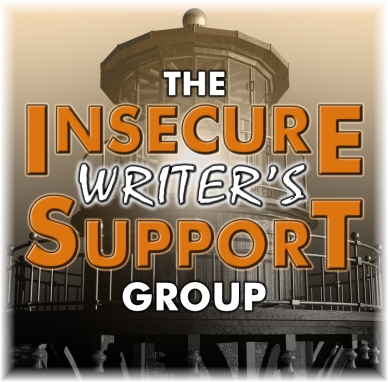Today’s post is a part of a monthly blog hop called the Insecure Writer’s Support Group (IWSG) where writers can share concerns and bolster each other. You can see the participating blogs here. This is my first IWSG post. Planet Pailly’s IWSG posts about his muse inspired me to sign up and join the conversation.

I’ve been wrestling with the concept of why some stories should be written rather than filmed. Why it is we often hear “the book is always better.” Its easy to say, ‘I prefer to read, it’s a different activity than watching, I get to use my imagination’ and dismiss the argument as irrelevant, but I think writers have a vested interested to understand what books can do that films cannot. We should take advantage of those aspects, shouldn’t we?
According to a 2015 article by Carol Test, the reason the written word is unique is because of the ‘interiority’ of the book or short story. When we’re reading, we are able to follow the story directly from the character’s, or narrator’s, mind. We open a book, put on their perspectives like a coat, and watch the world from their eyes.
But consider movies like 2011’s Limitless, where the character’s interiority anchors the story. My partner watched Limitless over the weekend, bringing it to mind quickly, but a slew of others follow. Fight Club. Six Feet Under. Eternal Sunshine of the Spotless Mind. Most film makers chose not to use interiority as a device, but the fact remains that they can, and they do.
Words can be chosen to manipulate a reader into a certain frame of mind or expectation, but a movie score can do the same.
Where is the space where books remain unique?
I’m pulled back into those earliest of writing lessons, teachers rapping on and on about using all five of the senses. Movies, I realize, can only use two senses: sight and sound. Touch, taste, and smell are a void. Movies smell like popcorn, the touch of buttery fingers, and the acrid taste of buttersalt. They can show you the incense burning in a medieval church, but it takes the written word to fill your senses with musky, perfumed smoke thick enough to hide the smell of the congregation’s unwashed bodies. To remind you of how its half-forgotten scent clings to your woolen tunic and your hair as you walk home.
Can it be as simple as these three missing senses? I don’t know. My gut says there’s more, much more, and to keep hunting. Books hold space in our lives. There’s poetry and rhythm and so many things to consider, to experiment with.
That said, I’ll be extra conscious of writing touch, taste, and smell into my work this week. What do you think? What else can books do that films cannot?

That’s a really good point about the difference between books and movies. I do prefer the books, and yes, it’s because I can get into the characters’ heads and there are all the senses. Plus sometimes little background bits that films don’t have time for.
LikeLiked by 1 person
Excellent point about the background bits! They sometimes take on such lives of their own. I remember watching the series of Jonathon Strange and Mr. Norrell and missing all the little rabbit holes I found in the footnotes.
LikeLike
Welcome to IWSG!!!!
Books are so much more powerful than movies for me. Scenes from books tend to stick with me and for some reason the emotions are more powerful than watching a screen.
LikeLiked by 1 person
Thank you for the warm welcome!
I agree, they are more powerful. For whatever reason, I tend to remember stories I read better as well. Perhaps because it takes more effort on our part to bring them to life?
LikeLiked by 1 person
I think that each has a place in entertainment. Books can be an individual thing and many readers enjoy the visual experience of the waking dream. Depending on how fast you read it could last quite a while. Where movies are about two hours and a community experience of the same visual. They both entertain but each in their own way.
Anna from elements of emaginette
LikeLiked by 1 person
Hmmm. I hadn’t considered the individual experience vs the community experience. Thank you for bringing it up.
LikeLiked by 1 person
Oh yay!!! Welcome to IWSG!!! And what an awesome first post!
As someone who used to work in movie production and who still works in television, I’ll say this: there are also things a visual medium can do that the written word can’t. It’s worthwhile for writers to know about that too.
My go to example is Jurassic Park. That’s the only case where, in my opinion at least, the movie is better than the book. Jurassic Park is almost all about spectacle (in the Aristotle sense of the term), and it’s only in the movie that you actually get to see the spectacle of dinosaurs lumbering around.
Anyway, I’m really excited you’ve joined IWSG. Looking forward to hearing more about your own writing adventures.
LikeLiked by 1 person
Thanks for such an awesome welcome James!
There is a LOT film can do that books cannot. A Jim Henson book just isn’t the same as his films (although I do love the recent comics). I guess that’s why I’m trying to see the other side of the coin.
LikeLiked by 1 person
It’s definitely good to be able to see the advantages and disadvantages of different creative forms. You know I hadn’t thought of this before, but I wonder how the novelizations of movies compare to the movies themselves. I feel like the movies would have to be better than the books in those cases, but I’m not sure.
LikeLike
Welcome to IWSG! This is a thought-provoking post, and I believe that’s another element to writing. Movies can do the same but often they press forward full steam ahead with little time to reflect on the deeper things. With books, you can pause and really think about something if you wish. Once again, books and movies can both do this, but the movie trend seems to be more action and explosions less plot these days. 🙂
Plus, when you read your brain gets to work and fill things in. When you watch you’re being told exactly what to “see” and your brain has to work very little. I believe we were created to think for ourselves and books allow us to do so.
LikeLiked by 1 person
awesome answer, Charity. I do enjoy thinking for myself.
LikeLike
Welcome to the IWSG! Every once in awhile, I read a book that I think would actually make a better movie. That’s not necessarily a bad thing! 🙂 It’s just something about it feels more visual, like I can see it playing it out on a large or small screen. I’m wondering now if that’s because there’s less attention to the other senses?
LikeLiked by 1 person
Wow, maybe. I’ve read books like that as well, usually books aimed for younger readers, I’ve noticed. It does make sense those books would focus more on the action than the senses. Hmmm. Now I want to go read some of them and get to the bottom of this!
LikeLike
One of the biggest differences between “book” and “movie”, aside from senses you mentioned, is length. A movie adaptation works best from a novella or even a short story. Two or three sentences in the written work can reference great background information, or the author can devote pages to describe the setting. Film makers can’t pause (though at home we can) to let the audience drink all of the details of the scene, nor can they devote precious on screen minutes to helpful but sidetracking background information.
I think another big difference is what the reader brings to the written work, in terms of their own imagination or experiences. Often we hear people say “that’s not what I pictured”.
LikeLiked by 1 person
I think your comment just helped me figure out what’s wrong with a story I’ve got on hold. Thanks Peter!
The idea of the reader as an active participant is huge. How much control do we as writers have over the way the story plays out to them? I’ve read books when I was a teen that are completely different from when I chose to re-read them as an adult.
LikeLike
What a great post. I definitely think with books, as a reader we are able to get much more background on characters and storyline than we ever could in the time constraints of a movie.
LikeLiked by 1 person
Thank you, Doreen. You’ve hit on an excellent point. This kind of depth is crucial in literature.
LikeLike
And on the reverse, there are things that movies take into account that we rarely do as writers which elevate the whole experience to a new level. I did a guest post on it here: http://mpaxauthor.com/2013/11/21/moonless-in-clips-crystal-collier-wishes-the-moon-was-made-of-cheese
LikeLiked by 1 person
Interesting concept! I agree — think the visual nature of movies (and the time constraints) makes it difficult for them to sometimes get at the interior monologue.
LikeLiked by 1 person
They each have their own advantages. Sometimes the placement of a camera or the specific movement of an actor can convey meaning that you could never do in words. But words can put you more deeply in to the mind of the MC than a movie ever could. I enjoy them both.
LikeLiked by 1 person
We make books we read our own, whereas a movie is well, what you see and hear is what you get.
LikeLike
Books fill in all the details that movies cannot and they inspire our imagination.
Welcome to the IWSG!
LikeLiked by 1 person
Some things lend themselves to visuals, but many other types of stories benefit so much from us being in the characters’ heads. Like you said, the senses that can’t be shown in movies can be depicted in writing. We rely a lot on our visuals, but there’s so much more to the human experience.
LikeLiked by 1 person